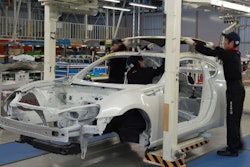A recent government report suggests that autonomous vehicles could affect the jobs of millions of people who drive for a living — but that three times that number could see their jobs improved by the technology.
The Wall Street Journal this week detailed the findings from three Commerce Department economists, who sought to evaluate how self-driving systems would impact current occupations. The report did not address the new jobs that could be created by autonomous driving.
The economists found that 15.5 million jobs involve driving and could be affected by the new technology, which equated to more than 11 percent of total U.S. employment in 2015.
Of those jobs, 3.8 million people, in essence, drove for a living: semi-trucks, ambulances, buses, taxis and other vehicles.
Those workers are not only "more likely to be displaced" by autonomous systems, but, the report said, more likely to "have difficulty finding alternative employment" because they are, on average, older, less educated and have "fewer transferable skills."
The other 11.7 million jobs, however, include driving as "only one of many important work activities."
The economists wrote that individuals in that group — which includes everything from in-home health workers to first responders to real estate agents — would likely benefit "from greater productivity and better working conditions" if their vehicles drove themselves.
In addition, those workers would probably adjust more easily to a changing driving economy because their jobs "already require the kinds of non-routine cognitive skills that are becoming increasingly in demand."
The Journal listed heavy and tractor-trailer truck drivers as the largest group that could be affected, with nearly 1.7 million drivers as of 2015, followed by more than 1.3 million personal care aides and nearly 1.1 million security guards.






















